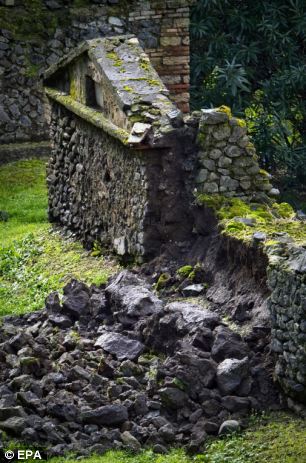For centuries the city has been preserved under layers of volcanic ash after an eruption of Mount Vesuvius in 79 A.D., which killed thousands of people.However, now the Unesco world heritage site, visited by 2.5million people every year and is one of Italy's most popular attractions, faces a new threat - from the weather.Italian culture officials are calling for swift action to save Pompeii from further damage, after Saturday's rainstorm was believed to have caused the partial collapse of a wall around a necropolis and falling stones at the Temple of Venus.Officials said the wall of a tomb around 5.5ft high and 11.5ft long collapsed in the necropolis of Porta Nocera in the early hours of Sunday.That followed a smaller collapse on Saturday of part of an arch supporting the Temple of Venus. Heavy rains were cited as the immediate cause.The Temple of Venus is in an area of the site which was already closed to visitors, while access to the necropolis has been sealed off following the collapse of the wall.However, the remainder of the site remained open to tourists today, although its offices were shut.Giancarlo Galan, the head of a parliamentary culture commission, on Sunday lamented the latest collapse at the archaeological site near Naples, while culture minister Dario Franceschini has raised concerns about the state of one of the world's most treasured archaeological sites.Pompeii, which was rediscovered in the 18th century, has been hit by a series of collapses in recent months and years which have sparked international outcry over the neglect of the site.Last year, the Italian government appointed a special official to ensure that European Union and Italian funds were properly spent to repair and protect Pompeii.Mr Franceschini, appointed last month in the new government of Prime Minister Matteo Renzi, summoned officials responsible for the site to Rome for an 'emergency meeting' on Tuesday.He said he wanted a report on the reasons for the latest collapses and would verify routine maintenance at Pompeii as well as the progress of an ambitious restoration project launched last year with European Union funds.Italian media have highlighted the contrast between the management of Pompeii and a successful exhibition about the ancient Roman city at the British Museum in London last year, which attracted record numbers of visitors.Pompeii was home to about 13,000 people when it was buried under ash, pumice pebbles and dust as it endured the force of an eruption equivalent to 40 atomic bombs.Two-thirds of the 165-acre town has since been uncovered.(dailymail.co.uk)ANN.Az
Ancient Roman city of Pompeii starts to CRUMBLE - PHOTO
World
10:45 | 05.03.2014

Ancient Roman city of Pompeii starts to CRUMBLE - PHOTO
The ancient Roman city of Pompeii has begun to crumble after heavy rain reportedly caused part of a tomb wall and a temple to collapse.
Follow us !










